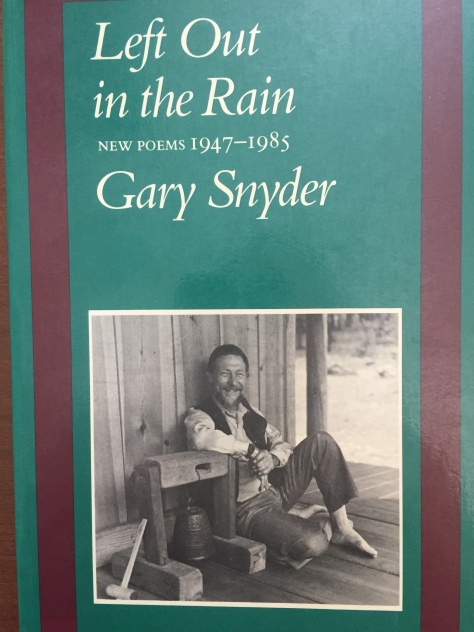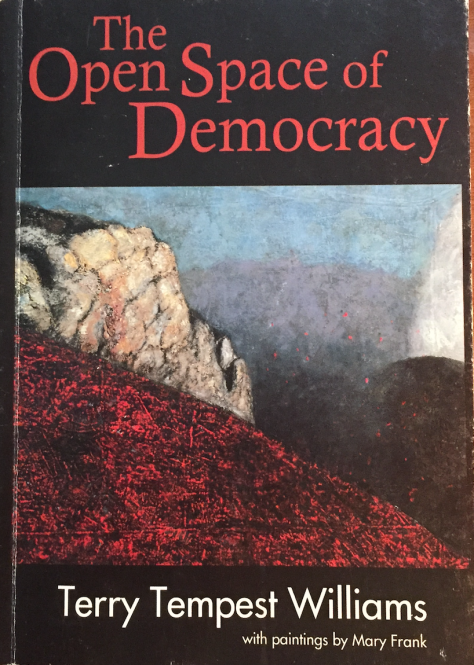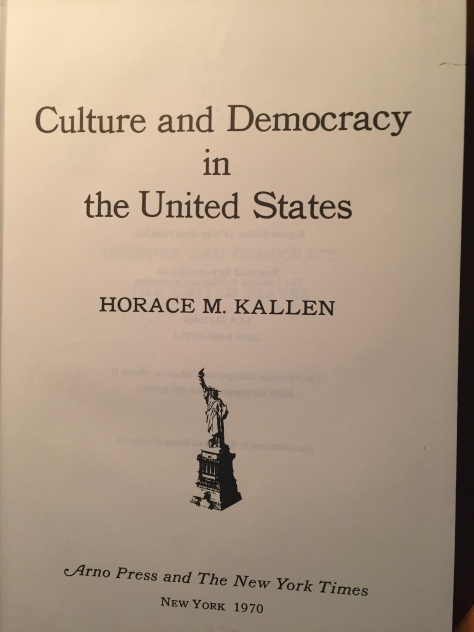As students of literature and culture well know, one way to make sense of experience is through poems.

Here is one by Gary Snyder, from his collection Left Out in the Rain, that invites one way of making sense of the course called The Open Space of Democracy:
The Trail Is Not a Trail
I drove down the Freeway
And turned off at an exit
And went along a highway
Til it came to a sideroad
Drove up the sideroad
Til it turned to a dirt road
Full of bumps, and stopped.
Walked up a trail
But the trail got rough
And it faded away—
Out in the open,
Everywhere to go.
The poem moves from declarative certainty (“is not”) to a journey that involves mechanics and turns. Things (cars, freeways and highways, sideroads) drop away. Full stop. Walking. A trail. Fading away. And then. . . .

Debriefing The Open Space of Democracy began for me with rereading the blogs as well as spending time with the individual projects you developed over the second half of the semester. Most of you commented on the open and integrative pedagogical elements of the course. Here are some of the elements you mentioned:
- learning to shape your thinking in writing in a public forum using a blog and wrestling with questions of genre and audience;
- taking up (or not) the invitation to annotate, a way to “read aloud” and to read together;
- adapting to the class method of a professor who composed thirty posts across the semester to tell a story, thinking with the words and ideas of authors who have generated and sustained an engaged audience—a story that that would otherwise be delivered in a lecture format;
- using classroom time each week to organize what each of you appeared to be interested in through generating key terms and project ideas in a “collaboratory” setting that made it possible to spend our face-to-face meetings learning how to use appropriate methods for studying different kinds of cultural artifacts, including verbal and visual texts, experience, story, and discourse;
- conducting archival work, practicing archival methods and, receiving credit as a contributing editor to a published work
- learning through experience to engage yourself in the rigorous process of producing intellectual work with purpose and integrity.
The responses to these elements were not all positive. Nor should they be. A few of you mentioned the challenges of sustaining engagement with a literary and cultural tradition, locating the survey of literature in historical and cultural context, adapting to the changing timeline and deadlines of the course, and navigating the self-directed model of project-based learning. There were also close to a half dozen comments on how a practice that was at first unfamiliar and challenging (writing on a blog, for example) became something that was more familiar, more interesting, more useful.

Course Outcomes
Your debriefing came to me in a number of forms: reflective commentaries and meta-commentaries during the course, the learning outcomes you composed during the final examination period, the “dear Mark” letters, and other notes that have come to me. Your insightful comments took a number of forms and I have shaped below into a take-away list that will be useful for all of us. I ask you to write the learning outcomes at the end of the course because, as the list below will demonstrate, the outcomes for each of you are not necessarily the same.
The list is organized into three categories. Almost every outcome in the list below was mentioned in one way or another by more than one student in the class. I hope that my translation of the outcomes and their listing is useful in some way for each of us. For it is helpful to know what you know so that you can do things well.
 Understanding of Democracy and Culture
Understanding of Democracy and Culture
An understanding of the history and evolution of democracy as an organizing idea/ideal/ideology for organizing human experience in the United States
An understanding of the concept of democratic culture that emerged in the nineteenth century and the development of this concept through the present
An understanding of democracy as a process that is dependent upon diverse and creative human practices
An understanding of democracy as at once a dream and a nightmare—an inspired aspiration and a haunting contradiction
Reading, Thinking, and Writing
An ability to read in and across multiple and intersecting literary and cultural products in cultural, historical, and literary contexts
An ability to use a social annotation platform (hypothes.is) to annotate texts and to read and discuss a text in a digitally-mediate format
An ability to think with the thoughts of others who have contributed to the ongoing conversation about literary and cultural production in the United States
An ability to think about reading and writing (in this case writers and artists thinking about democracy) that invites the integration of learning in other courses and experiences outside of school
An ability to read, understand, and apply ideas in literature, political philosophy, and theories of socially engaged art
Project-Based Learning and Digitally-Mediated Intellectual Work
An experience working on a self-defined and self-directed intellectual project that is part of a collective project of making visible the creative and critical work of the classroom
An understanding of how to use technological tools (Word Press) to build a project that includes a range of textual forms: writing and other materials: individual experiences, socially engaged practices, photographs, letters, newspaper articles, etc.
An ability to use archival methods of descriptive commentary and metadata in cataloguing primary documents
An ability to practice writing as a public activity for different audiences using language that will engage different kinds of people
An understanding of writing as a process and that curating writing and ideas is ongoing work that involves other writers and readers
An ability to formulate a concise statement of purpose and a method of organizing and developing writing in the public domain
An understanding that meaningful intellectual work that has integrity begins with discovering what you are doing and then working hard to do it well
An understanding of the exacting skills of revising, editing and proofreading written work that is published in a public and open network
